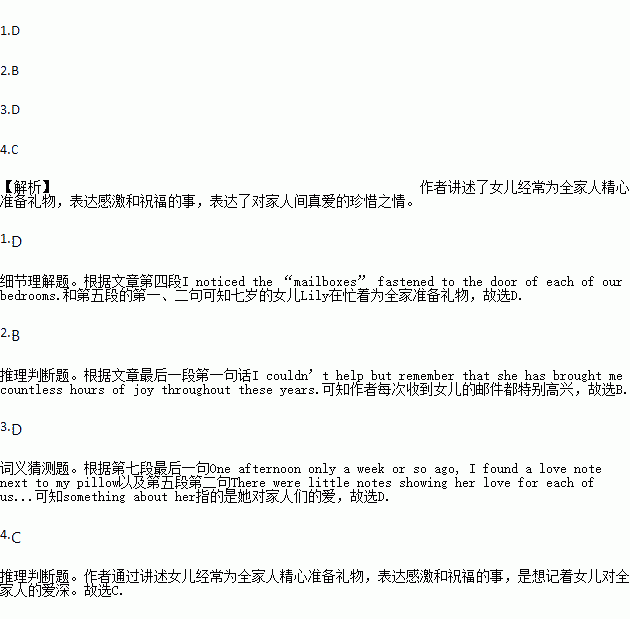题目内容
Many years ago, on a winter morning, Lily, our only daughter, sat quietly, all her heart put into her work. Every once in a while she would ask how to spell the name of someone in our family, and then painstakingly(费力地) formed the letters one by one. Next, she added flowers and green grass at the bottom of each page with a sun in the upper right corner, surrounded by the blue sky. Holding them at eye level, she was satisfied.
“What are you making, honey?” I asked.
“It’s a surprise,” she said, covering up her work with her hands.
It wasn’t until later that evening that I noticed the “mailboxes” fastened to the door of each of our bedrooms. There was one for Edward, one for Tom. She hadn’t forgotten Peter and baby Paul.
For the next few weeks, we received mail regularly. There were little notes showing her love for each of us and short letters full of tiny things that only a seven-year-old child would notice. I was in charge of retrieving baby Paul’s letters, page after page of colored scenes, including flowers with happy faces.
“He can’t read yet,” she said, “but he can look at the pictures.”
This little girl grows up now, but something about her has never changed. One morning only a week or so ago, I found a love note next to my pillow.
“Thanks for always being there for me, Mum,” it read, “I’m glad that we are best friends,”
I couldn’t help but remember that she has brought me countless hours of joy throughout these years. There are angels among us. I know, I live with one.
1.What was Lily busy doing that afternoon?
A. Playing a spelling game.
B. Examining her work carefully.
C. Doing her drawing homework
D. Preparing love notes for the family
2.Every time the writer received her daughter’s mail, she felt___.
A. surprised B. happy
C. proud D. interested
3.The underlined words “something about her” in Paragraph 7 mean__.
A. her habit of writing letters to her friends
B. her interest in drawing pictures
C. her action of giving us surprises on purpose
D. her love for the family members
4.Why did the author write the passage?
A. To draw people’s attention to her daughter
B. To tell people her daughter’s growing stories.
C. To remember the true love from her daughter,
D. To describe the angel living with her all her life.

